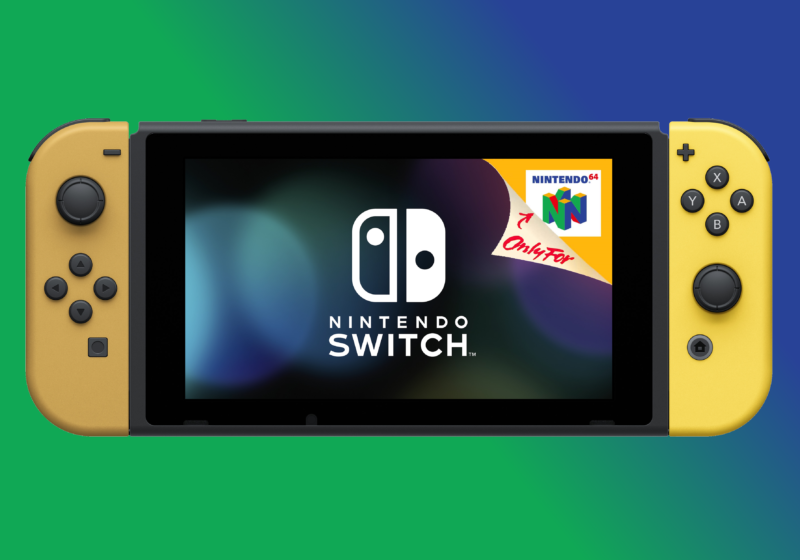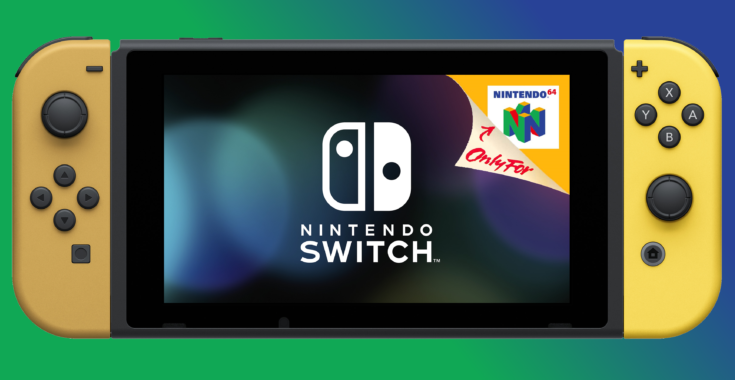
Nintendo / Sam Machkovech
On Thursday, the latest Nintendo Direct presentation confirmed something most Nintendo fans had either suspected, hoped for, or predicted (based on a recent FCC “controller” tip): the N64 is finally back. Instead of a miniaturized N64, however, the company’s first dedicated 3D-rendering console is returning as part of a software suite on Nintendo Switch.
And in classic Nintendo fashion, Thursday’s announcement only told some of the story.
So far, we know that the initial selection of the NSO “Expansion Pack” will include nine N64 games, ranging from classics like Super Mario 64 and Mario Kart 64 to niche surprises like Winback: Covert Operations. These games will require an additional fee over NSO’s standard $20/year rate, though Nintendo has not yet announced a price for this tier. The company also did confirm plans to roll out seven more N64 games at some point, particularly Rare’s Banjo-Kazooie, which hasn’t been seen on a Nintendo console since Microsoft bought the developer in 2002.
What we don’t know—and what I’d like to estimate, ahead of the N64 tier’s October rollout—is how many, or how often, new N64 games might be added to the NSO service in the months ahead, and which third-party hits may join its current roster of first-party titles. Without further word from the big N itself, we can look to the company’s track record thus far.
Ahead of its release, Nintendo has provided this somewhat revealing peek at the upcoming Nintendo Switch N64 Wireless Gamepad. Notice the tiny “ZR” button at the top, next to USB Type-C port. This implies that the unseen “Z” button beneath the joystick will correspond with Switch’s “ZL” button in native software.
NintendoThe nine games launching with NSO’s N64 expansion sometime in October.
NintendoThis version of Super Mario 64 differs compared to its inclusion in 2020’s Super Mario 3D All-Stars. Older in-game UI, less up-scaled textures. In great news, color accuracy is much improved compared to Nintendo’s dismal N64 emulator on Wii U.
NintendoThis Yoshi’s Story screenshot arguably does the most to show how “faithful” N64 emulation will look on Switch. The original hardware smothered everything, including sprites, in unseemly blur, and that appears to be in full effect for Nintendo’s latest N64 emulator.
NintendoZoom in to look at how Nintendo’s latest N64 emulator handles the original hardware’s built-in blur and texture filtering.
Nintendo
Crunching the numbers
Delving into Nintendo’s track record of current NSO games for NES and SNES, along with N64-specific offerings from Wii and Wii U’s Virtual Console stores, yields some interesting results. To date, NSO’s standard service tier gives Switch owners access to 58 NES and 49 SNES titles, dating from 2018 and 2019, respectively. (Note: these numbers don’t include the “SP” versions of certain games Nintendo has periodically added. These are special “cheat code” editions of titles like Zelda or Metroid that start players out with all gear unlocked, max rupees, and other perks.)
Nintendo opened fairly strong with its NES support on NSO in September 2018, dropping 31 games over NSO’s first six months. From there, each 4-6 month calendar window dwindles.
- Feb-July 2019: 15 additional NES games
- Aug-Dec 2019: 4
- Feb-July 2020: 4
- Sept 2020-July 2021: 4
Out of the 673 games released during the NES’s lifespan in North America, this puts the total available via NSO at 8.6 percent.
A year after NSO’s NES launch, Nintendo added Super Nintendo games without raising the service’s costs. The company launched its SNES support with 20 games in September 2019. Its update cadence from there is more irregular than with NES, but overall the numbers are still relatively low.
- Sept 2019-Feb 2020: 6 additional SNES games
- May-Sept 2020: 9
- Dec 2020-May 2021: 11
- July 2021: 3
All told, that puts the number of SNES games on NSO at roughly seven percent of the console’s 717 North American titles released.
What about Virtual Console?
As for Nintendo’s record of N64 releases on the Wii U and Wii’s defunct Virtual Console storefronts, the numbers are paltry: just 21 games were made available for each. Of these, the lineup is almost exactly the same, mostly pulling from Nintendo’s first-party catalog of hits like Super Mario 64, Ocarina of Time, Majora’s Mask, Mario Kart 64, Kirby 64, Star Fox 64, and other expected classics.
The lower number of N64 retail releases in North America altogether—only 296 games—may be partially to blame for the lower number here. That still only puts Nintendo’s VC offerings at seven percent of the complete lineup stateside, lower than either the NES and SNES choices Switch owners can currently access through NSO.
Judging from Nintendo’s already confirmed titles, there’s not much commitment (yet) to offering much more for N64 than they have in the past, at least not publicly. Out of the 16 North American titles announced at yesterday’s stream, only three haven’t seen a digital, post-N64 release in the U.S.: Dr. Mario 64, Winback, and Banjo-Kazooie. The latter is undoubtedly the biggest surprise with the most significant implications, given Microsoft’s ownership of Rare. That means MS owns any of Rare’s N64 games that didn’t feature licensed characters like Donkey Kong or Mickey Mouse, which is why many of Rare’s N64 games appeared on Microsoft’s 2017 anthology Rare Replay.
If Nintendo plans to release a similar number of N64 games for the service over the next 2-3 years, Switch owners could be looking at getting a new bump of 4-6 new additions every 5-6 months. On the other hand, should Nintendo decide to dig deeper into console’s back catalog, there’s no way of knowing what it might be. With a general shrinking pattern for game drops across NES, SNES, and N64, however, it’s a bit less likely the company intends to pull out many of N64’s deeper cuts.
Third-party support
This brings us to third parties. Unlike NES and SNES, classic games from third-parties on N64 are decidedly fewer. With Banjo-Kazooie coming back to a Nintendo console, NSO could eventually see other Rare entries added from Xbox’s Rare Replay collection, with Jet Force Gemini, Blast Corps, Banjo-Tooie and potentially even the original, uncensored version of Conker’s Bad Fur Day (over the tweaked-and-bleeped Conker: Live and Reloaded for the original Xbox) all seemingly potential candidates. And if the stars align, maybe we’ll see the return of a certain FPS starring a secret agent.
The list of NSO’s third-party studios on NES and SNES also points to some historical patterns—namely the inclusion of Japanese developers with powerhouse reputations in the 8- and 16-bit eras. Konami, Capcom, Koei Tecmo, Natsume, and Arc System Works pop up a lot trawling through NSO’s NES and SNES libraries (with a few others which no longer exist or have been absorbed into parent entities), though pulling out more than a few known-quantity N64 entries isn’t as straightforward.
But as you may recall, Nintendo’s ironclad support from Japanese studios dwindled in the face of fierce PlayStation competition, which leaves fewer candidates to pick from across the board. Winback‘s inclusion, while welcome, comes from Koei Tecmo, so it doesn’t add a new third-party to Nintendo’s list of NSO partners. Potential Konami titles might include Castlevania: Legacy of Darkness (probably the more likely choice over its very different vanilla version Castlevania 64), or if someone wanted to get really wacky, the Goemon games or a year-specific sports title like International Track and Field 2000. Capcom only released three games for the console: ports of PS1’s Mega Man Legends and Resident Evil 2, as well as Magical Tetris Challenge (which starred Disney cartoon characters, so that’s a long shot). Natsume only released one N64 game, Harvest Moon 64.
None of this speaks to how Nintendo may handle future launches for the Japanese side of NSO, by the way. If we’re lucky, we could see untranslated N64 weirdness arrive in that region’s NSO package—and get those games as region-free downloads, in the same way that Western players can access Famicom and Super Famicom libraries on Switch via some Nintendo eShop trickery. Soon after NSO’s N64 service launches, its Japanese equivalent will get two Japan-only games in the Custom Robo series, which will provide a good test case for possible region-free fun from the 64-bit generation.
Ultimately, with fewer N64 games to choose from across all regions, especially compared to PS1’s explosion during the same era, our expectations are generally slim. And Nintendo’s unwillingness to launch certain N64 exclusives on older Virtual Console platforms, including Pilotwings 64 and Mischief Makers, doesn’t instill confidence that they’ve gone to greater license-agreement lengths this time around—especially since they’re not getting packaged in an attractive, miniaturized set-top box. It’s probably best to prepare for a distinct lack of boat-rocking here beyond what’s been made available on Virtual Console and the total number of games, first-party or otherwise, that the company might consider worthy enough to re-release.
At least Nintendo’s on the right track with that authentic controller—and we’ll be back to report on that controller’s build quality, and how well it works with the upcoming NSO pack of N64 games, in a future follow-up.



